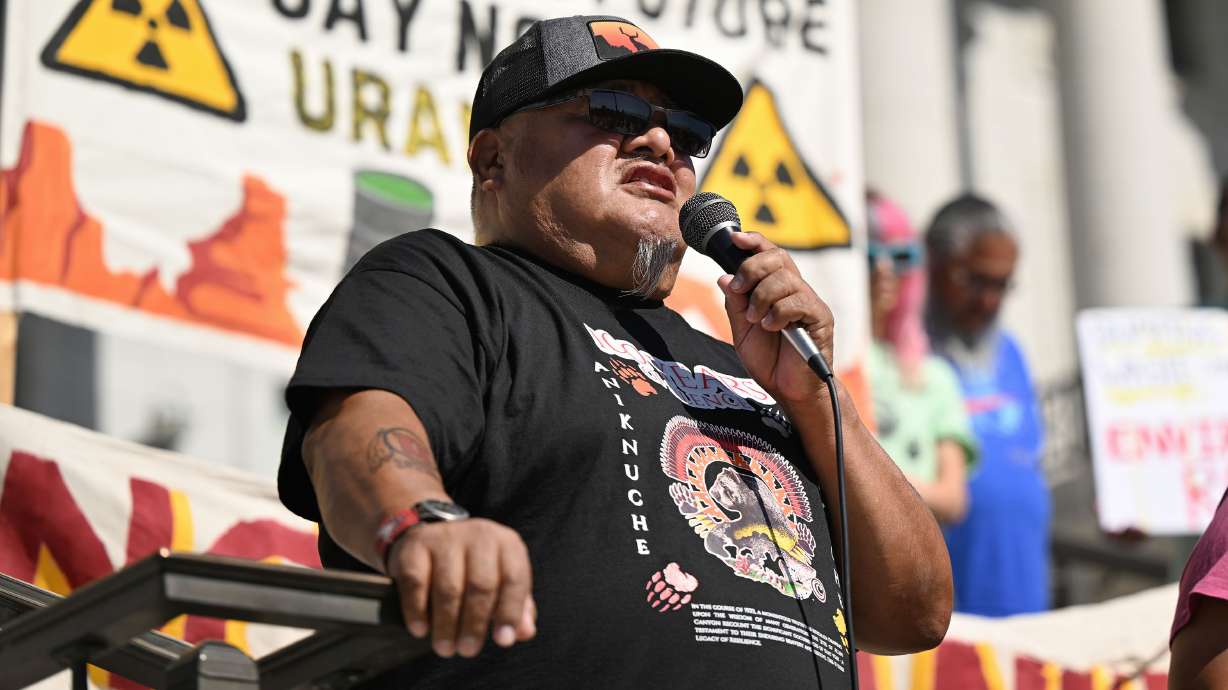Estimated read time: 4-5 minutes
This archived news story is available only for your personal, non-commercial use. Information in the story may be outdated or superseded by additional information. Reading or replaying the story in its archived form does not constitute a republication of the story.
- Members of the White Mesa Ute community are pressing for closure of the Energy Fuels uranium mill near Blanding.
- At a demonstration, they expressed concerns about the mill's potential health effects, though Energy Fuels says the facility adheres to strict safety standards and monitoring protocols.
- The situation underscores a broader distrust among some Native American communities rooted in the adverse impacts of uranium mining in years past.
SALT LAKE CITY — With the Energy Fuels uranium mill sitting just miles from her home in the White Mesa community near Blanding, Yolanda Badback is torn.
"I want my community to have good air quality, good water resources," she said.
With the White Mesa Mill, as it's called, so close to her Ute Mountain Ute tribal community, though, she worries that's not possible, and at a demonstration at the Utah Capitol on Friday voiced her aspirations in plain terms. "My goal is to close it or shut it down completely," she said.
Members of the White Mesa Ute community traveled to Salt Lake City on Friday, meeting privately with Utah government officials to voice their concerns, particularly the potential for health problems. "I want them to know how we feel because we live there and that's our homeland, and I will never leave my homeland for anything," Badback said.
After that, they and their advocates gathered on the south steps of the Capitol for the demonstration, expressing their hope that the facility be closed or moved. The Energy Fuels website says the mill — which processes uranium ore hauled in to the facility — is the only fully licensed conventional uranium mill in the United States.

"We fought this monster for a long time. Now it's time to lay it to rest and have it move somewhere else," said Michael Badback, Yolanda Badback's brother. He spoke of strong odors wafting to the reservation, more scant plant life and health problems among the elderly, contrasting that with life growing up in the area before the mill's construction, when "Mother Earth was so strong."
The White Mesa Ute residents' concerns notwithstanding, White Mesa Mill said in a statement in response to the demonstration that the facility is safe and subject to strict monitoring to make sure it doesn't threaten the public. Uranium produced at the mill, part of the portfolio of assets of Lakewood, Colorado-based Energy Fuels, is used at nuclear energy plants.
"There is no evidence that points to the mill causing any adverse health or environmental impacts. It is disheartening to see opposition to the mill and our recycling programs that is based on myths, outdated beliefs and outright falsehoods, which activist organizations use to create unfounded fear in the community," reads the statement. The mill, it went on, "operates to the highest standards in the world — something Utahns and all Americans can be proud of."
Likewise, a 2023 U.S. Department of Health and Human Services report supplied by Energy Fuels concludes that White Mesa residents are unlikely to be harmed by radiological contaminants from the air or by drinking from the local water system. "We have something like 100 monitors across the site for air, radon, groundwater, etc., to ensure our operations present no threat to public health or safety or the environment," Energy Fuels said.

Beyond that, Energy Fuels noted the key role of uranium from the White Mesa Mill in producing nuclear power, "by far the best and most reliable source of carbon-free electricity."
Either way, uranium mining of yesteryear has a dark legacy in many Native American communities, which suffered the ill effects of suspected radiation exposure, and suspicion and concern still run deep. After two trucks hauling uranium ore traversed Navajo Nation land en route to the White Mesa Mill last July, leaders of the reservation cried foul. Buu Nygren, the Navajo Nation president, issued a six-month order requiring Energy Fuels to reach an accord with the reservation before transporting radioactive material through the reservation.
Scott Crow, environmental programs director for the Ute Mountain Ute Tribe and another speaker at Friday's demonstration, alluded to the Navajo Nation incident, suggesting a repeat could spur moves to prevent the passage of any trucks hauling ore. "So we stand in solidarity with our neighbors on that, and we have yet to have a roadblock. But let me tell you — it could be coming soon," Crow said. "We'll let you know if we need some human bodies out there, but I wanted to share that that's on the horizon."

Expounding on calls for closure of the White Mesa Mill, Crow said the Ute Mountain Ute tribe favors the use of renewable energy to address climate change issues, but not nuclear power.
"We understand that you can generate electricity without a lot of carbon pollution once you have your fuel rods in place," he said. Installing the rods, though, "is a poisonous, disastrous process" that can cause great harm to people.
As part of their ongoing efforts, White Mesa Ute community members plan a walk on Oct. 12 to the White Mesa Mill as a form a protest. They also call on supporters to press the issue with lawmakers.









